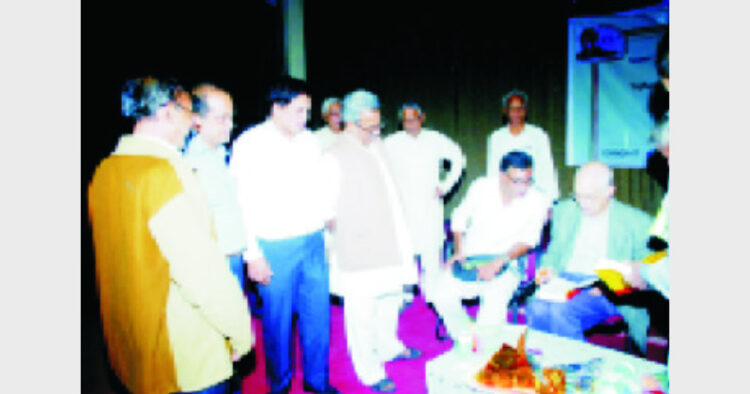Influence of Indian philosophy on the West
India’s epic tales, Ramayana and Maha-bharata are so rich in magic, mystery and metaphor that they make the Illiad and Bible seem like austere short stories. Compared to India’s ornate temples, colourful rituals and pantheon of gods and goddesses, Roman Catholicism seems as plain as vanilla, said Philip Goldberg, a inter-faith Minister from USA. The function was organised by Andhra Pradesh unit of Pragna Bharati in Hyderabad on November 23. The topic of discussion was ‘Influence of Indian philosophy on the West”. Apart from Mr Goldberg, Shri Sunaina Singh, Vice chancellor of English and Foreign Languages University, Hyderabad and Shri Arvind Rao, former DGP of Andhra Pradesh also spoke on the occasion.
Mr Goldberg delivered a brilliant account of how America embraced the Vedanta starting way back from Emerson and Thoreau in the 18th century. The Beatles Group, group of scientists, Hollywood actors, senators, poets got attracted to Vedanta and changed the way they perceived life. The primary reason, he said was the openness, depth and vastness of the Vedanta against the religion in which they were born which is based on beliefs alone and threatens the disbelievers with eternal hell. He also praised the open mindedness of the Americans who are open to everything and accept anything. Vedanta quietly surfaces in the daily lives of Americans. Yoga, Karma, meditation and enlightenment are now household words. He has written a book called “American Veda”, which explains the impact of Vedic Culture on US. He said among the profoundly ambivalent were a handful of missionaries who were theologically committed to the doctrine of salvation in Christ but who also found profundity in Vedanta. He said they saw that Hindus were quite content with their own religion and more than willing to accept Jesus as exceptional sage, and wondered why they are converting natives instead of learning from them.
To a question posed to him very oftenly by Indians, “while Americans are learning so much from India, Indian youngsters are running after America and American culture — what could be the reason?”, he said it is an unfortunate thing and he would suggest to Indian youngsters that while there is a good deal to learn from America, there is much more which Indians should not learn too. The best thing for the Indians to learn from Americans is their growing inclination towards Sanatan Dharma. And I was in confusion at the end whether to feel proud of my dharma for changing the lives of so many foreigners too or to feel ashamed listening to a foreigner teach the greatness of Sanatan Dharma and advising to follow the same, the dharma in which I was born.
He hailed that each generation of diaspora of Hindus is better assimilated, more confident and more outspoken in defending their heritage from misconceptions and stereotypes. India’s emergence as an economic power and strategic partner guarantees that individuals will be shutting between the two countries at an ever accelerating clip furthering respect for its religious legacy.
Prof. Sunaina Singh recalled that the early translations of Vedic texts found their way to the West in the opening decades and influenced Jefferson, Adams, Emerson and Thoreau. Shri Aravind Rao called life is a spiritual journey toward an awareness of the true source of our being. The ultimate destiny of every individual soul is to awaken to the true source of its being God itself.
Shri T Hanuman Chowdhary, Chairman Pragna Bharati, recalled that Swami Vivekananda returned to his homeland in 1896 and ordered his two disciples to carry on his work in US. He had left India a nameless monk but on his return he was greeted as a triumphant hero. It is indeed true in his message. Swami urged his countrymen to lay claim to their spiritual heritage and revitalise the nation.
RSS Sahsarkaryavah Dr Krishna Gopal, Dr Sadanand Damodar Sapre, coordinator Pragna Pravah and other eminent scholars also attended the function. A souvenir entitled Viveka-Vani was also released on the occasion.
—Nagaraj Rao














Comments